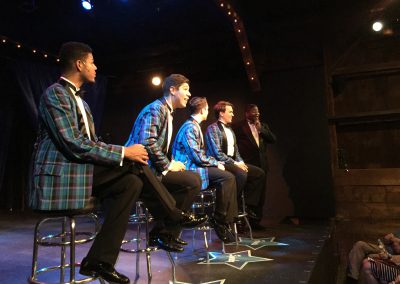The Performance of a Lifetime
The Depot Theatre’s 2019 season concludes with a heartwarming musical about a four-man singing group who – through Divine intervention – finally get the chance to put on the show of their dreams.
By Fred Balzac
“Jukebox musical” defines a type of show that features previously written songs – typically hits of a popular music group or genre – and, although more and more jukebox musicals seem to be springing up and getting produced, the term is not always one of endearment when used by theater professionals.
Not that there haven’t been some great jukebox musicals. Ain’t Misbehavin’, which reintroduced to late twentieth-century audiences the wonderful songs of Fats Waller, immediately comes to mind: it spawned a slew of similarly formatted shows when it was first produced on Broadway in the late 1970s and became a smash hit. Sadly, for theatergoers, many of that ensuing slew have been less than inspiring.
Jukebox musicals are attractive to theater companies because they can be produced economically, with relatively small casts, and – because they contain preexisting material that’s likely to be familiar with audiences – are usually easier to market than newer musicals with “original” content. However, those same advantages can also prove to be pitfalls in the creation of a jukebox musical and how audiences respond to it. If you’re not a fan of, say, 1950s doo-wop, you’re probably not going to enjoy sitting through a show devoted to it. Likewise, some creators seem to just throw a bunch of connected songs together without paying much attention to critical aspects such as narrative throughline.
One differentiating factor is the presence of a “book” or libretto, the part of a musical script that isn’t music or lyrics – i.e., spoken dialogue. Some jukebox musicals eschew a book altogether. The World Goes ‘Round, which opened the Depot Theatre’s 2019 season, has virtually no spoken dialogue; but, if you’re as big a fan of the songs of Kander and Ebb as I am, you don’t miss it.
On the other hand, the Depot’s current production, Forever Plaid, has a fairly robust libretto and, as a result, is much closer to a traditional book musical than many others of the jukebox variety. The show features hit pop songs of the 1950s and early 60s such as “Three Coins in the Fountain,” “Heart and Soul,” and “Love Is a Many-Splendored Thing.”
As a Baby-Boomer who came of age in the late 1960s/early 70s, I grew up avoiding a lot of these tunes, which I associated with my parents’ generation. But when put together in the context of Forever Plaid‘s affecting storyline, the songs are charming and one can appreciate the Tin-Pan-Alley-like mastery that went into creating them. And as produced by the Depot – with first-rate stage direction by Kristen Keim and choreography/music direction by Kenney M. Green and a standout cast of four young performers – Forever Plaid emerges as heartwarming entertainment that demonstrates just how good a jukebox musical can be.
Putting It All Together – in Eight Days
One factor in the development of a theater production that most playgoers don’t take into account when assessing a show (assuming they are even privy to the information in the first place) is the amount of rehearsal time prior to the opening. At the Depot, it’s a given that the rehearsal period will be a short one – usually only eight or nine days. That’s a steep hill to climb for any production, but for a show like Forever Plaid that features complex singing parts it’s especially challenging, according director Keim.
“It’s an insanely tough show, especially musically because the four gentlemen in the cast are singing four-part harmony for the entire show,” she said in an interview conducted at the theater prior to the final dress rehearsal. “Normally, shows rehearse three weeks to a month. These actors learned it in eight days, and they sound wonderful.”
Besides the music – which Ms. Keim compared to barbershop quartet and the sound of such pop groups as the Four Aces – her actors were also required to learn fairly complicated blocking (non-dance movement onstage) and choreography. “We’re talking tight harmony and tight choreography, so they’re amazing to me,” she said. “All of them have done a fantastic job.”
Forever Plaid tells the story of four friends who met in high school, loved to sing and discovered that, when they sang together, their voices melded in beautiful harmony. They formed their own group, called “Forever Plaid” after the Scottish tartan cloths they wear while performing.
“Just starting out, they’re going to their first semi-big gig in a 1954 Buick convertible when they’re hit broadside by a bus full of Catholic schoolgirls who are on their way to see the Beatles on the Ed Sullivan Show,” said Ms. Keim, adding that the young men were killed in the accident and went to heaven. “That was 1964 and today, through Divine intervention, the four performers get to do one show back here on Earth that they never got to do while alive. The show is now [August 2019].”
Beyond the Fringe
Although Forever Plaid has been produced widely since it debuted in 1987, this is the first production of the musical that Ms. Keim has worked on and she saw the show only once before – by watching a video of the original Off-Broadway production. A Depot first-timer, she came to the theater company by way of Mr. Green. “Kenney and I have been friends for years,” she said. “When he took over as Producing Artistic Director, he asked me to send a resume in. I did, then got a call and got hired.”
Trained as a dancer in both modern and musical-theater dance, Kristen attended Hunter College in New York City where she segued into directing, working with adult actors in children’s theater productions, and at age 19 started creating choreography professionally. “I went to college for dance,” she recounted. “Directing is something I always wanted to do – I just thought it’d be later.”
She has now been directing professionally for about seven years, including shows at the New York International Fringe Festival and the Planet Connections Theater Festivity, where she was nominated for best direction of a play. “Coming here has been a departure,” Ms. Keim said. “The last few shows I’ve directed have involved working on stuff like at the Fringe – developing the material directly with writer. Scripts get changed and you get to flesh it out with the actors. Plaid is a known and published show where the characters are fully fleshed out.”
With an eight-day rehearsal process, a director has to trust that actors will come in having done their homework, Ms. Keim observed. “Rather than trying to build their characters with them, directing, in this case, is more like guiding them,” she said. “It’s all in the script. These characters jump off the page. Each of the characters has an ailment – asthma, bloody noses, upset stomach, a speech impediment – these are the cornerstones for the actors to work from.”
You’ve Gotta Have Heart
Although Ms. Keim enjoys handling both direction and choreography in the same show, having Mr. Green serve as choreographer along with music director gave Kristen and Kenney the opportunity to work together on a production for the very first time. “With another person doing the choreography, you have to communicate, have to negotiate: what goes where, why does it go there?” she said. “This show’s especially dependent on music and choreography, so you really have to work collaboratively.”
For his part, Mr. Green drew on his experience performing in Forever Plaid, in the role of Jinx. “For preparation, I went back to the joy I felt when I was a Plaid almost 20 years ago,” he recalled. “I wanted to make sure that our cast was given the same lineage that I received, by researching the Four Aces and other groups, [and also] being true to the time period and the text surrounding it.”
He found that the most challenging aspect of the show for him to impart to his performers – and for them to maintain from rehearsals to opening night and throughout the run until closing – involved the acapella number, “Scotland the Brave.” “It comes right after a very physical part of the show for the four of them,” said Mr. Green. “They must then collect their thoughts and become as one, singing in tight four-part harmony without any help from me at the piano, [while] also maintaining the innocence of these characters throughout the piece without upstaging each other.”
Asked what he wished Depot audience members would take away from a performance of this version of Forever Plaid, Mr. Green replied that he hoped audiences would leave the theater realizing that the message of the company’s entire 2019 season has been humanity itself. “The World Goes ‘Round focused on relationships,” he said. “An Act of God, when watched with an open mind, was about questions that we mere mortals navigating through life are prone to ask a ‘higher power.’ And Forever Plaid is about the innocence and joy trying to be recaptured or corrected after receiving our ticket to the ‘afterlife.’ Overall, no matter the odds, we are humans trying to do good in this world.”
As for Ms. Keim, she emphasized the sheer entertainment value of the show while pondering my question about its underlying theme. “It’s fun,” she said. “These boys are entertaining. For anyone who remembers the Ed Sullivan era, a lot of the songs will be familiar – ‘Three Coins in the Fountain,’ ‘Heart and Soul,’ ‘Perfidia,’ to name a few. These songs have become so iconic.
“Overall, it’s a feel-good show. Throughout the show you see [these characters] fall in love with the music all over again. There’s a lot of heart in it, and we played up the heart.”
Responding to my question about her use of the word “boys” to describe her cast, Ms. Keim said that, while the characters are clearly young men in their early 20s, they each radiate a boyish charm stemming from lives cut short before they could experience much of the joys of adulthood. “They never got to fall in love, get married, have kids,” she observed.
All of which pointed to the musical’s underlying theme: “No matter what setbacks you have in life, if you put enough work into it, you can get there,” she remarked thoughtfully. “No dream is too big.”
__________
Fred Balzac’s connection with The Depot goes back two decades when he and his wife, Kathleen Recchia, a current member of the theater’s board of trustees, took their then-four-year-old son, Samuel, to his first professional theater production, The Pajama Game, which helped inspire Sam’s current career as an actor and composer-lyricist. Fred, Kathy, and Sam remain avid members of The Depot’s extended family. This article was written for the Depot website.
Forever Plaid marks the Depot debut of Devin J. Hall, who plays Jinx; while Dan Bob Higgins, who plays Smudge, is already a company veteran, having appeared in the season opener, The World Goes ‘Round. Fred Balzac caught up with both of them via separate email interviews; the following is an edited transcript of their responses to his questions:
Q: What was it that attracted you to Forever Plaid, including the character you play, that led you to decide to take the role at the Depot?
Devin J. Hall: There are multiple answers to answer that question – for starters, representation! As a proud African-American male, I wanted to break barriers with the role and who traditionally plays it. I think it’s very important to show diversity onstage and I was honored when I got the offer to play the character. Depot has such a wonderful reputation – actors who have worked here have stated [that] the experience is life changing as a performer, and so I knew I wanted to be part of the experience. Diving into the show, I didn’t realize how much of a throughline there is about brotherhood and how we must look out for one another. I instantly fell in love with the story. When I was a child, my Daddy would always play doo-wop music groups like the Moments, the Delfonics and the Stylistics. That style of music spoke so much to my heart at such a young age that I wanted to sing in a quartet group one day. And now I get the opportunity.
Dan Bob Higgins: When Kenney presented the offer for Forever Plaid midway through the run of The World Goes ‘Round, I jumped at it. I loved the music and have wanted to sing in a quartet with such beautiful harmonies. Also, it presented me with a great opportunity to sing in my lower register. Kenney has been an amazing mentor for me, so to be able to work with him even more was another reason I jumped so quickly at the proposal.
Q: What kind of preparation did you do for the role prior to your arrival in Westport?
Dan Bob Higgins: I actually never left Westport prior to the start of rehearsals! To prep, I watched the show both on YouTube and a [recording of a production] one of my friends had been in. Kenney also came by a couple of days to work on some of the harmonies with me before the rest of the cast arrived.
Devin J. Hall: These four men that have been singing since high school together are characterized as a barbershop quartet, which codifies as a style of tight-harmony singing. With that, I had to step away from solo singing to be able to understand the definition of “blending.” I did lots of listening to 50s- and 60s-style quartets such as the Four Aces, the Temptations and the Beach Boys.
Q: What was the most challenging thing(s) you had to do during rehearsal or is the most challenging thing(s) you do in performance? What was or has been the most surprising?
Dan Bob Higgins: The music is certainly the most challenging! The harmonies are so tight and clash with each other during many of the songs. We all had to work together as a group to really listen closely to one another. Also, it has been difficult to relax and not rush through certain parts of the show. With your brain always running a mile a minute, you forget to breathe and ease yourself into dialogue and songs. Sometimes, you need to take a step back and really focus together with the whole group to accomplish the goals as one.
The most surprising? I think of it more as the most rewarding! The four of us work really well as a unit and, with Kenney at the helm on piano, we all feel very safe, loved, and invincible!
Devin J. Hall: Some might not know but we put up the entire show in eight days! That includes learning all the music, choreography, lines and blocking. We worked so hard to make this show what it is and the process was fast and furious! I wouldn’t classify this as surprising, but I’m so grateful that the universe allowed me to work with the other three men I get to share the stage with. We have created a bond in such a short amount of time onstage and offstage that is authentic, and I think the audience will truly witness the brotherhood we have created.
Q: What has your overall Depot/Westport, NY experience been like on or offstage, given that this is only your first or second production at the theater?
Devin J. Hall: I am incredibly thankful for this theater and town. Everyone has been so nice and welcoming, and I couldn’t ask for more. The production team has been nothing but amazing, supportive and inspiring to work with. In addition to Kenney Green being the Artistic Director for the Depot, he is also our musical director/choreographer and what a treat that is. He is such a hard worker and has done this show numerous times, so we were able to get insight/vision and the sound of the show through his lens. Kristen Keim is our director, and she brought her vision to this show and guided us to get to victory in telling this story.
Dan Bob Higgins: My experience here in Westport has been nothing short of amazing! From reconnecting with friends [and] making new friends in each of the shows to exploring all the Adirondacks have to offer, I have been having the time of my life. I feel very fortunate to be a part of the shows here, as well as share these shows with such great audiences. It truly has touched my heart.
Q: What do you hope audience members experience during, or take away from, a performance of Forever Plaid?
Devin J. Hall: I hope the audience will experience going back in time and hearing songs like “She Loves You,” “Heart and Soul” or even “Sixteen Tons” and instantly relive that era. You will laugh numerous times, you will dance in your seat (or out of your seat) and you might even let your hair down and “Cry.” This show has so much heart that I think any audience member can relate to it. Kids will enjoy these four men’s stories, and [the show] will educate them on where the music we listen to now came from. This show is for the entire family and you don’t want to miss it.
Dan Bob Higgins: I hope the audiences laugh, have fun, but also leave with feelings of love. There is such a huge sense of nostalgia in this show; all of these songs and references can touch audiences of all generations and ages. I hope they all leave singing songs, commenting on funny moments and remembering the depth of all Forever Plaid has to offer!
###



